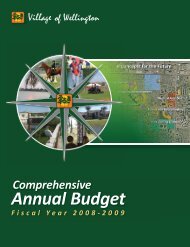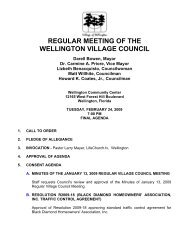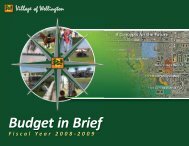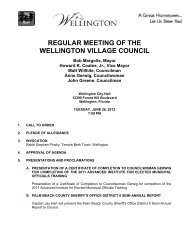village of wellington, florida
village of wellington, florida
village of wellington, florida
Create successful ePaper yourself
Turn your PDF publications into a flip-book with our unique Google optimized e-Paper software.
NOTE 1.SUMMARY OF SIGNIFICANT ACCOUNTING POLICIES (Continued)Measurement Focus, Basis <strong>of</strong> Accounting and Financial Statement Presentation (Continued)When both restricted and unrestricted resources are available for use, it is the Village’s policy to userestricted resources first, then unrestricted resources as they are needed.Deposits and InvestmentsCash and investments <strong>of</strong> each fund, except certain investments in the debt service and enterprise funds, areaccounted for in pooled cash and investment accounts with each fund maintaining its proportionate equityin the pooled accounts. The use <strong>of</strong> a pooled cash and investment account enables the Village to invest idlecash for short periods <strong>of</strong> time, thereby maximizing earnings potential. Income earned from this pooling <strong>of</strong>investments is allocated to the respective funds based upon average monthly proportionate balances.Investments are stated at fair value.The Village considers cash on hand, demand deposits, and all other short-term investments that are highlyliquid to be cash equivalents. Highly liquid short-term investments are those readily convertible to a knownamount <strong>of</strong> cash, that at the day <strong>of</strong> purchase, have a maturity date not longer than three months.All cash deposits are held in qualified public depositories pursuant to State <strong>of</strong> Florida Statutes, Chapter 280,“Florida Security for Public Deposits Act”, and are collateralized with eligible securities having a marketvalue equal to a percentage <strong>of</strong> the average daily or monthly balance <strong>of</strong> all public deposits. The Village’sinvestment practices are governed by Chapter 218.415 <strong>of</strong> the Florida Statutes and the requirements <strong>of</strong>outstanding bond issues.ReceivablesReceivables include amounts due from other governments and others for services provided by the Village.Receivables are recorded and revenues are recognized as earned or as specific programexpenditures/expenses are incurred. Allowances for uncollectible receivables are based on historical trendsand the periodic aging <strong>of</strong> receivables.Inventories and Prepaid ItemsInventories are valued at the lower <strong>of</strong> cost (first-in, first-out) or market. The Village uses the consumptionmethod wherein all inventories are maintained by perpetual records, expensed when used and adjusted byan annual physical count.Certain payments to vendors reflect costs applicable to future accounting periods and are recorded asprepaid items in both the government-wide and fund financial statements.Restricted AssetsCertain debt proceeds, as well as certain resources set aside for their repayment, are classified as restrictedassets because their use is limited by applicable bond covenants.Capital Assets and DepreciationCapital assets, which include property, plant, equipment, and infrastructure assets (e.g., roads, sidewalks, andsimilar items), are reported in the applicable governmental or business-type activities column in thegovernment-wide financial statements. Capital assets are defined by the Village as assets with an initialindividual cost <strong>of</strong> $1,000 or more and an estimated useful life in excess <strong>of</strong> one year.The accounting and reporting treatment applied to the capital assets associated with a fund are determinedby its measurement focus. General capital assets are assets <strong>of</strong> the Village as a whole. When purchased, suchassets are recorded as expenditures in the governmental funds and capitalized as assets in the government-33












